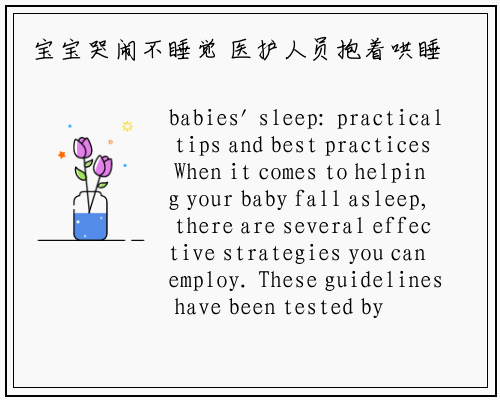babies' sleep: practical tips and best practices

When it comes to helping your baby fall asleep, there are several effective strategies you can employ. These guidelines have been tested by parents and researchers, ensuring that they're both safe and beneficial for the little ones in your care.
-
Avoid over-protecting during sleep: When baby's restless or barking, don't rush him into sleeping. Instead, let him rest with you on the bed. Place him close to you so he can feel secure without being overbearing. Use gentle touches like rocking, patting, and loving cuddling to soothe him. These actions not only help him fall asleep but also provide comfort during this crucial period.
-
Practice sleep hygiene: Encourage your baby to establish a routine of sleeping with you on the bed. This helps them learn proper sleep habits and builds confidence in their ability to fall asleep independently. Start by giving consistent opportunities for your baby to rest without any pressure, gradually increasing these moments as they grow older. Over time, this will help reduce reliance on you during nighttime.
-
Use active sleep techniques: Research shows that when parents touch a baby's face or arm while watching them walk, it can help the baby relax and fall asleep more easily. This method is especially effective for babies with sleep issues. Parents should be mindful of their own comfort levels and choose actions that are gentle yet effective.
-
Stay calm during sleep: If your baby feels tired or restless at night, don't panic. Allow yourself to notice any signs of increasing tiredness, which can indicate they're ready for rest. Remind them of the importance of sleep and reassure them that you're there to help. Remember, it's okay for babies to feel overwhelmed during sleep.
-
Avoid forcing your baby into bed: It's important not to press buttons or force your baby into a nighttime lie. Instead, focus on providing safe and loving stimulation. Use toys and activities they enjoy to keep their attention during the night.
-
Be patient with your baby: Sleep development varies among individuals, so it's essential to allow your baby time to explore and establish routines. Give them opportunities to move around independently and let them discover new ways to feel safe and secure.
-
Monitor sleep quality: Regularly check if your baby is staying asleep or feeling tired during the night. This can help identify any patterns or concerns that may require further attention from you.
In conclusion, helping your baby fall asleep isn't just about following a set of rules but also about creating a caring environment where they feel secure and supported. By implementing these strategies thoughtfully, you can provide the best possible care for your little one's sleep needs.